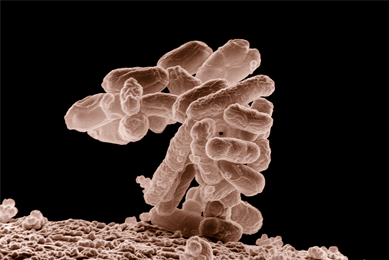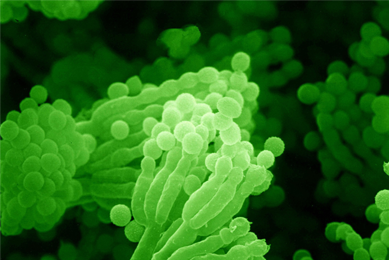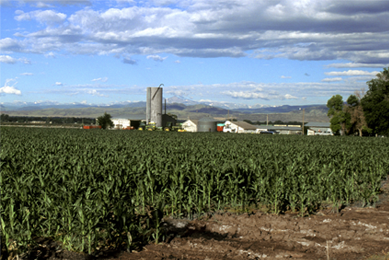Why it's important
According to the National Academies of Sciences, the United States gets 81% of its total energy from coal, oil, and natural gas.1 While these fossil fuels currently help generate the energy needed to support residential, commercial, transportation, and industrial sectors, they are a nonrenewable resource and will eventually run out. With global energy consumption expected to rise 40% over the next two decades, identifying different sources of sustainable energy is important.2
What’s the process?
Microbial-produced biofuels provide one strategy for sustainable energy. Many microbial species can convert biomass into fuels like bioethanol and biodiesel by using natural metabolic pathways. One notable example is Saccharomyces cerevisiae, which can produce bioethanol through the fermentation of nonfood lignocellulosic wastes like rice husks, wheat straw, or corn stover.3-5 Lignocellulosic biomass is considered a promising and low-cost substrate for producing biofuels and using it can help reduce waste disposal.3,6
Other microorganisms like microalgae have been investigated as a feedstock to generate biofuels through various processing pathways such as transesterification of lipids, fermentation, or anaerobic digestion.7 Some of the advantages of using algal biomass include their fast growth rate, ability to grow on water sources unsuitable for irrigation (eg, wastewater, brackish water), and efficient use of carbon dioxide.8
Many microbial species can also be genetically modified to further enhance their ability to produce biofuels.9 For example, one of the barriers in microbial biofuel production is the generation of end products and by-products that are inhibitory or toxic to the microbial strain. Engineering strains to have high tolerance levels to inhibitory compounds can help improve biofuel yields.9
How we can help
As the leading developer and supplier of authenticated biological materials, ATCC provides the scientific community with access to an expansive collection of credible microbial strains. Our portfolio includes a variety of algae, bacteria, and fungi with potential biofuel production capabilities. ATCC is also working on providing the reference-quality, whole-genome sequencing data of our microorganisms through the ATCC Genome Portal.
Did you know?
ATCC has been a trusted resource for microbiological materials for nearly 100 years.
Shahin Ali, PhD
Senior Scientist, Collections, ATCC
Dr. Ali is a Senior Scientist at ATCC with over 13 years of experience in the field of fungal biology and plant-pathogen interactions. Before joining ATCC, Dr. Ali worked for the USDA-ARS at Beltsville Agricultural Research Center, Maryland. He obtained his PhD from University College Dublin, Ireland.
Cara Wilder, PhD, ELS
Senior Scientific Writer, ATCC
Dr. Wilder is a Senior Scientific Writer at ATCC. She has a PhD in Microbiology with background experience working with several pathogenic bacterial species in both in vitro and in vivo environments. Dr. Wilder is the author of numerous publications on varying topics of scientific relevance, including quality control, microbial contamination, assay development, proficiency testing, and multidrug resistance.
Dig deeper into our collection of microbe products

Bacteriology and Archaea
ATCC offers a variety of bacterial and archaeal strains with applications in a variety of research and industrial applications. Our growing portfolio includes antimicrobial-resistant strains, quality control organisms for commercial identification systems, a wide selection of extremophile strains, and genomic and synthetic DNA.
More
Mycology
Mycology strains are vital for advances in biomedical, pharmaceutical, and commercial research, which is why ATCC offers a vast collection of antimicrobial-resistant fungal strains, quality control organisms, and genomic fungal DNA.
More
Environmental
Identifying microbial pathogens in water and soil through environmental testing is essential for protecting human health. Ensure the accuracy and reproducibility of your detection assays with authenticated, high-quality reference materials from ATCC.
MoreReferences
- The National Academies of Sciences. What You Need to Know About Energy: Our Energy Sources. Accessed online October 12, 2022 http://needtoknow.nas.edu/energy/energy-sources/fossil-fuels/.
- The National Academies of Sciences. What You Need to Know About Energy: How We Use Energy. Accessed online October 12, 2022 http://needtoknow.nas.edu/energy/energy-use/.
- Tesfaw A, Assefa F. Current Trends in Bioethanol Production by Saccharomyces cerevisiae: Substrate, Inhibitor Reduction, Growth Variables, Coculture, and Immobilization. Int Sch Res Notices 2014: 532852, 2014.
- Singh A, Bajar S, Bishnoi NR. Enzymatic hydrolysis of microwave alkali pretreated rice husk for ethanol production by Saccharomyces cerevisiae, Scheffersomyces stipitis and their co-culture. Fuel 116: 699–702, 2014.
- Karagoz P, Ozkan M. Ethanol production from wheat straw by Saccharomyces cerevisiae and Scheffersomyces stipitis co-culture in batch and continuous system. Bioresource Technology 158: 286–293, 2014.
- Narisetty V, et al. Waste-Derived Fuels and Renewable Chemicals for Bioeconomy Promotion: A Sustainable Approach. Bioenergy Res Mar 25: 1-17, 2022.
- Zewdie DT, Ali AY. Cultivation of microalgae for biofuel production: coupling with sugarcane-processing factories. Energ Sustain Soc 10: 27, 2020.
- Behera S, et al. Scope of algae as third generation biofuels. Front Bioeng Biotechnol 11, 2015.
- Adegboye MF, et al. Bioprospecting of microbial strains for biofuel production: metabolic engineering, applications, and challenges. Biotechnol Biofuels 14: 5, 2021.